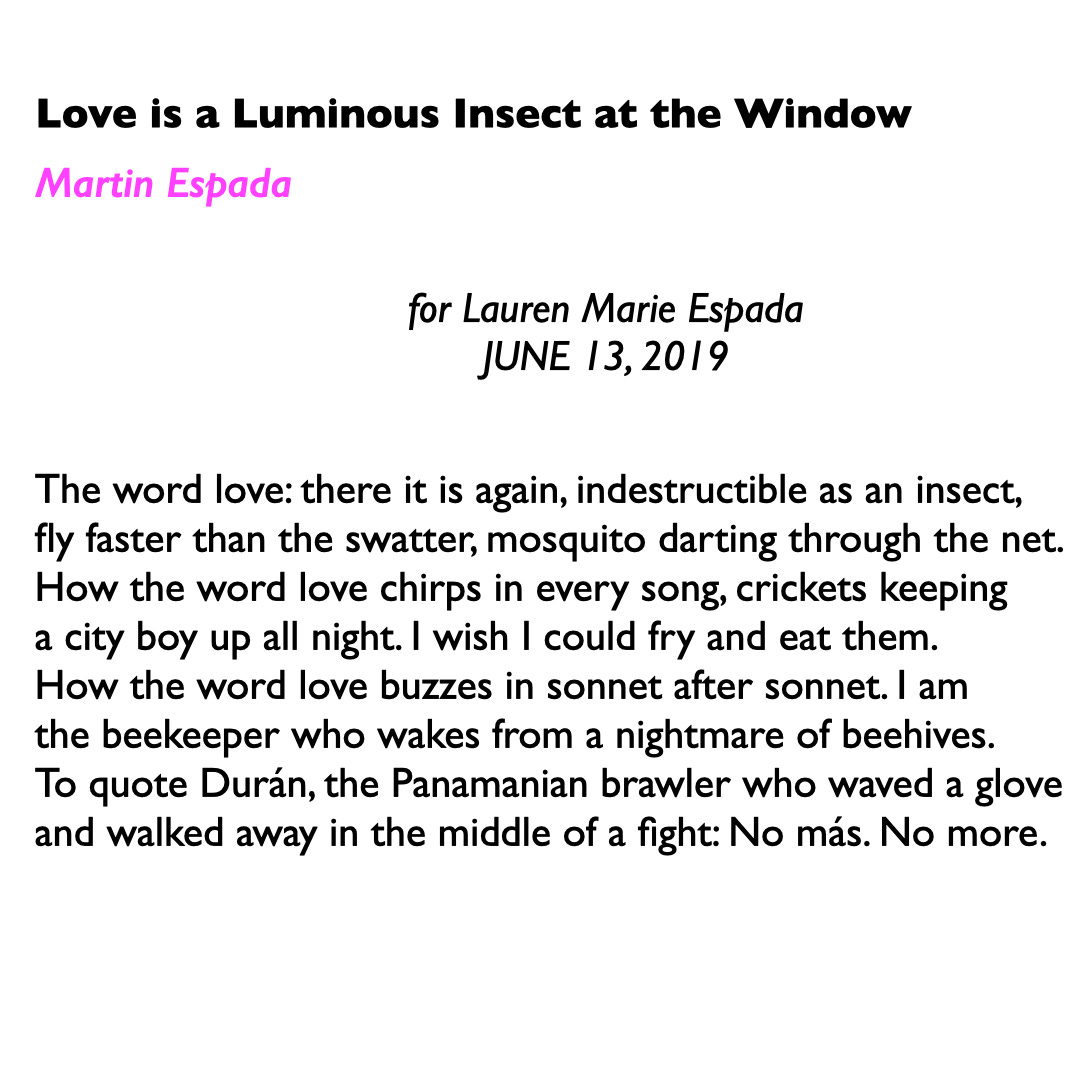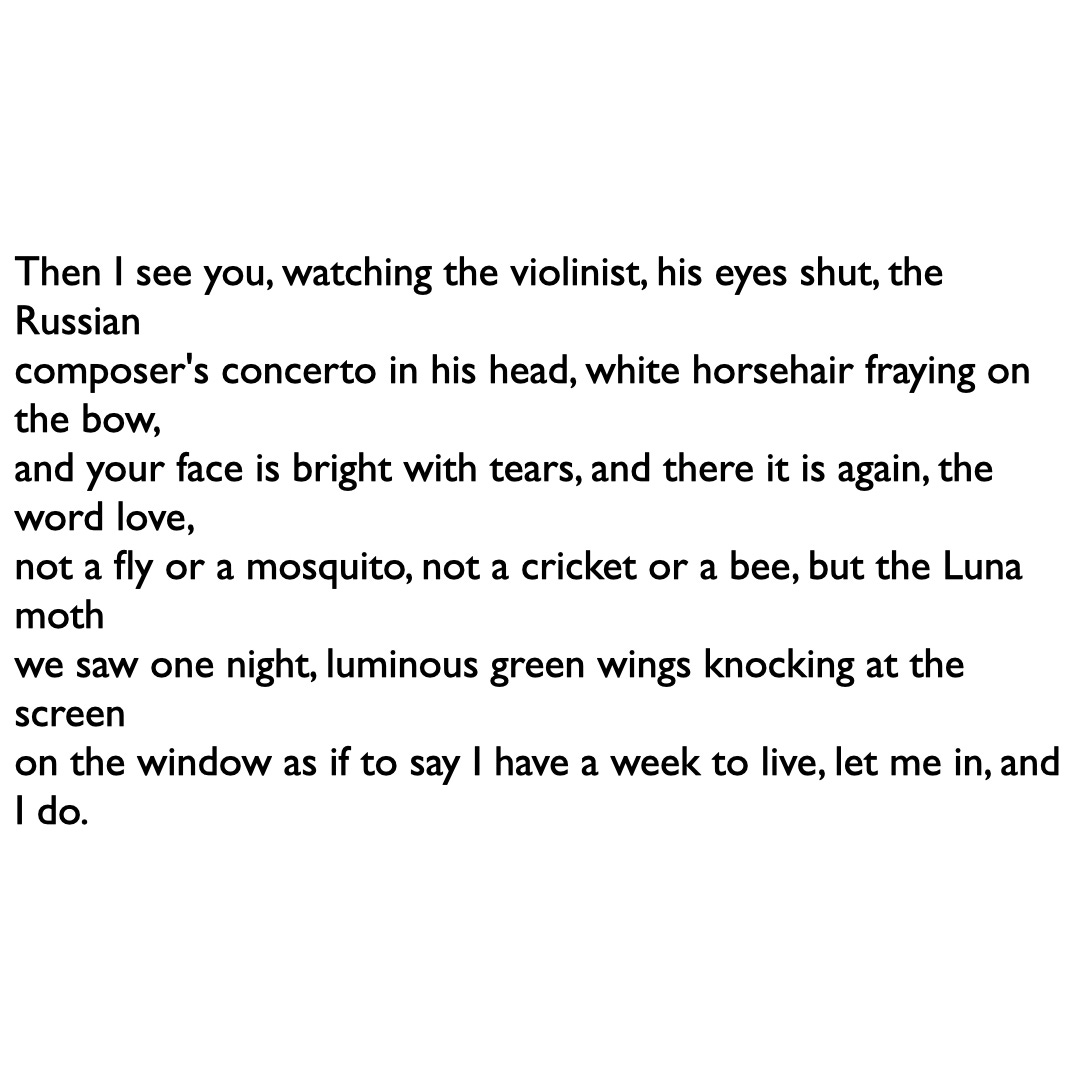There It is Again: Martín Espada's "Love is a Luminous Insect at the Window"
A Guest post by Zainab Ummer Farook
It is Valentine’s day, and some of the online newsletters I subscribe to, have used this opportunity to recruit more readers, promising discounted rates on special editions, merchandise, books, and so on. Artists are parodying the failed project of the Animal Welfare Board to seed some bovine love within the populace. It is in the context of the politicisation of this somewhat doomed project of modern love and public space, that I remember the ‘Pink Chaddi’ campaign, today. I was less than 10 minutes away from the ‘pub’ in Mangalore when the louts from Pramod Muthalik’s Shri Ram Sena attacked women for being ‘loose’ and engaging in ‘activities’ that offended their prudish, warped Hindutva sensibilities. After the incident, Muthalik threatened "Our activists will go around with a priest, a turmeric stub and a mangalsutra on 14 February. If we come across couples being together in public and expressing their love, we will take them to the nearest temple and conduct their marriage”. Nisha Susan launched a group called “Consortium of Pub-Going, Loose and Forward Women” as an act of resistance, and it was through this group, (which had already gone viral worldwide) that the call to action was made for the Pink Chaddi Campaign (PCC). The protest, which was conceptualised as a non-violent mode of disruption, urged people to send pink underwear to the head office of Shri Ram Sene, cos “Chaddis are forever”. The Campaign was hugely successful - apart from the fact that the Sene and its actions were condemned across the country, on Valentine’s day, parcels arrived in astonishing numbers at Muthalik’s office and residence. This happened in 2009. I am drawing attention to this now familiar event, because it remains a shining example of how popular celebrations can be reimagined as sites of free thought, political mobilisation and identity formation. The celebration of the this Archies-Hallmark promotional event was historic, because it exposed the absurdity and banality of Hindutva.
Today’s commentary is not really about the politics of love. In fact, it is a happy accident that it is being shared on Valentine’s day. I do not presume to share this as a political act - there are enough people who have taken on that difficult burden, and they are doing it quietly, on the ground, where it matters, where most people do not have the privilege to think of celebrating their love with a handful of roses, or a special date.
Consider this, then, a kind Valentine’s Day gift, a lovely little contemplation by a poet, on love.
Zainab Ummer Farook writes with a keen eye and a light heart, about Martin Espada’s “Love is a Luminous Insect at the Window”. Having taken on that unimaginably difficult task of analysing love poetry, Farook proceeds to deconstruct this delightful and deceptively simple lyrical poem, allowing her own relationship with language and poetry to scaffold some critical comments on the craft. It is an absolute honour to curate this commentary on Poetly, and I am in awe of the sharpness and literary chutzpah that she brings to her writing.
Without further ado then…
At the end of every year, I go through the notes I've accumulated on Google Keep—usually an exercise in wading through ideas for poems, half-formed lines, new words I've stumbled across, movies and books and restaurants I want to check out someday, and the occasional to-do list I've forgotten to delete upon completion. It is a ritual that helps me travel back in time, an opportunity to recall the moments which resulted in those notes, and remember the people and places that held me over the course of the year.
Towards the end of 2022, however, I scrolled a bit too much (thanks to an excruciatingly long train journey) and took myself all the way back to 2020, where I had a note titled “Poems I want to write.” The first entry in it? A love poem.
My rationale then: are you even a poet if you haven’t written a love poem? But in hindsight, I wonder if 23-year-old me was jaded with writing poems rooted in grief, melancholia, rage; if I recognised, on some unconscious level, that “standing in the ashes is not work.” It wasn’t even particularly tough, delving into some of my most painful memories to find a kernel that could pop into a poem.
What I didn’t have was a vocabulary for joy and wonder, for vulnerability sans pretence. And where better than love poems to start?
***
The poem I'm offering to you today is Martín Espada’s “Love is a Luminous Insect at the Window,” from his 2021 collection Floaters.
As poem titles go, this one is straightforward yet retains intrigue: love and insects, really? I was reminded of John Donne’s “The Flea”, although the metaphysical poet’s insect conceit is decidedly of the please-have-sex-with-me variety, as opposed to the tenderness that Espada yields later.
But before the tenderness comes exasperation. The poem opens on a note of weariness with the word ‘love.’ Just as a fly, mosquito, or cricket, it is an elusive, cacophonous creature: droning in your ears, depriving you of sleep. The frustration is vocalised in the many plosive t’s of the first two lines, tempered only by alliteration and rhyme: indestructible/insect, fly/faster, faster/swatter, insect/net.
Evidently, this is not a person who thinks kindly of love. (One too many bad breakups, perhaps? Your garden-variety cynic?) After comparing love to crickets, the speaker says, “I wish I could fry and eat them,” which is as clear a statement of irritation as they come.
“How the word love buzzes in sonnet after sonnet,” is a line that does a bit of heavy-lifting. The word buzzes sets up the next line’s beekeeper and the nightmare of beehives. The line is also hilariously self-aware: Espada’s poem is a sonnet, perhaps the most famous poetic vehicle for love. Strip the form of its metrical considerations and you have a contemporary iteration: fourteen lines, has a volta, dwells on the topic of love. In short, we are presented with a speaker, who has seemingly been stung by love before, complaining about the buzzing of love in sonnets, in a goddamn sonnet.
The speaker is so done with love that he now conjures the figure of a brawler who once quit mid-fight. A professional who takes and dishes out pummels for a living, saying he’d had enough. A person who wants no more of love and all that it entails. The comparison has quite the dramatic flair; but then who doesn't, when faced with the prospect of knowing love's landscape again and again?
At this point, the poem's mood shifts, turns—the sonnet's volta. Espada underscores this spatially as well: the stanza break is larger than one would expect, perhaps suggesting a lengthy passage of time before the shift in mood happens within the poem’s universe.
Cut to our speaker, who beholds the beloved watching a violinist. The scene is awash with detail: the violinist’s eyes are shut, he’s deeply engrossed in performing a Russian composer’s work, the work is a concerto, the violinist’s bow is fraying. Very little is actually said about the beloved (“your face is bright with tears”), but that very little has an almost epiphanic quality to it. In watching the beloved being moved by the music, the speaker is moved as well. “And there it is again, the word love”, except this time it is not any of the insects that have vexed him so, but a Luna moth. A lime-green creature with a short lifespan, begging to be let in. And the speaker, for all his previous grouching about love, quietly gives in.
There is so much to adore in this poem: its sonic confidence, the way the central idea of love-as-insect shapeshifts in the first stanza and undergoes a stunning metamorphosis in the final lines, and the left-field image of the Panamanian brawler right before the volta. But what floors me, above all, is the way the poem imbues the everyday, the ordinary—a moth!—with so much feeling. What could otherwise be taken for granted becomes a marvellous thing, despite its ephemeral nature (“I have a week to live”) or perhaps because of it.
I wonder if the ephemerality can be traced to the poet's biography: Espada read this piece for his wife at their wedding, bringing with him six decades of a life lived. (Note how the poem ends with an I do!) By inviting the Luna moth into his life at this juncture, does the poet-speaker acknowledge that the experience of love is worth cherishing regardless of how long it lasts, be it twenty seconds or twenty years? I don't know. I honestly don't know if reading poetry by the light of biography is a useful endeavour. But unearthing this nugget of information made my heart skip several beats, incurable romantic and trivia hoarder that I am.
Wedding poem it may be, but "Love is a Luminous Insect at the Window" is no grand-gesture poem a la Sonnet 116, where love “looks on tempests and is never shaken.” Espada's poem is my favourite kind of love poem, what I call the tiny-moment love poem, where the beloved shifts the world ever so slightly, the mundane is suddenly invested with significance, and time is suspended. The sort of poem that sings baraamade purane hai, nayi si dhoop hai—the verandahs are old, the sunlight is new. The sort of poem that croons nammude nenjilaake anuraaga karikkin vellam, where love is akin to tender coconut water. The sort of poem where the lover describes her beloved sneaking up on her and hugging her as kavidhai, poetry, and insists that love does not know the bounds of gadigaara neram, clock time.
Because what is love, if not an unabashed celebration of life's minutiae? And what is a love poem, if not the act of making new an unspeakably ancient emotion?
***
It’s been two years since I jotted down that I wanted to write a love poem. I have a handful of them now. I’m slowly making space for joy, hope, stillness in my work. It has been a much harder task than I anticipated, but there have been moments of grace, little poems in themselves.
Towards the end of 2022, I began working on a poem that was to hold a mirror to some of my anxieties. I struggled for over an hour to find the perfect ending. To my greatest surprise, it resolved itself as a love poem. Basking in the first-draft afterglow and the wintry sunlight, which was a smidge more golden than it was a minute ago, I wondered if Tishani Doshi was on to something when she wrote “always and only is a poem about love.”
Zainab Ummer Farook loves the sea and sad songs and purple flowers. Her poems can be found in The Bombay Literary Magazine, nether Quarterly, Narrow Road and On Eating.
I hope you are well!
If you like what you read, do consider ‘buying me a coffee’.
Note: Those, not in India, who’d like to support the work I do at Poetly, write to me - poetly@pm.me.
If you wanna share this post…





Each piece of this ❤️🧡